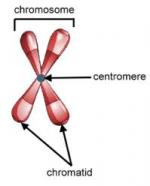|
This section contains 1,166 words (approx. 4 pages at 300 words per page) |

|
The chromosomal theory of inheritance is the idea that genes, the units of heredity, are physical in nature and are found in the chromosomes. The theory arose at the turn of the twentieth century, and became one of the cornerstones of the modern understanding of genetics.
The Birth of a Science
Charles Darwin first conceived the idea of hereditary units when he published his theory of pangenesis in 1868. In this model, circulating units called gemmules are accumulated in the gonads and transmitted to the off-spring. This theory was discredited by experimental tests performed by Francis Galton in the 1870s. Galton used blood transfusions in rabbits to show that the alleged gemmules in one rabbit's blood did not alter the heredity of the recipient rabbit's blood. In the 1890s Hugo de Vries took the term "pangenesis" and trimmed it to "pangene" for the...
|
This section contains 1,166 words (approx. 4 pages at 300 words per page) |

|


